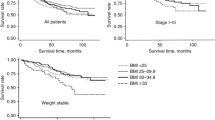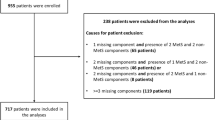Abstract
Background
Components of the metabolic syndrome (MetS) are involved in colorectal cancer development and the incidence of the disease is higher in obese and diabetic patients. Nevertheless, the value of these diseases or the MetS as a whole as prognostic markers once colorectal cancer is diagnosed is controversial.
Methods
Patients with metastatic colorectal cancer treated in our center over a 6-year period were reviewed and data on baseline characteristics of the patients and their cancers were extracted. Data on the presence and pharmacologic treatments of the four components of the MetS (obesity, diabetes, hypertension, and dyslipidemia) were also recorded. Overall survival (OS) and progression-free survival (PFS), Kaplan-Meier curves of the various groups were constructed and compared with the log-rank test.
Results
One hundred and twenty-three patients were included in the analysis. The prevalence of the four MetS components was 66.1% for overweight/obesity, 25.2% for diabetes, 61% for hypertension, and 41.5% for dyslipidemia. Among the four components of the metabolic syndrome, none was associated with either PFS or OS. Diabetes tended to approach significance for PFS (p = 0.08). The MetS as a whole did not influence survival outcome. MetS was not prognostic even if the overweight category was not considered as a positive element of the syndrome.
Conclusion
These data suggest that diabetes or other metabolic syndrome elements are not prognostic factors for PFS or OS in metastatic colorectal cancer. Further investigation may be warranted with a focus on refinement of the metabolic evaluation.


Similar content being viewed by others
References
Torre LA, Siegel RL, Ward EM, Jemal A. Global cancer incidence and mortality rates and trends- an update. Cancer Epidemiol Biomark Prev. 2016;25:16–27.
Voutsadakis IA. Pathogenesis of colorectal carcinoma and therapeutic implications: the roles of the ubiquitin-proteasome system and Cox-2. J Cell Mol Med. 2007;11:252–85.
Atreya CE, Yaeger R, Chu E. Systemic therapy for metastatic colorectal cancer: from current standards to future molecular targeted approaches. Am Soc Clin Oncol Educ Book. 2017;37:246–56.
Ansary Moghaddam A, Woodward M, Huxley R. Obesity and risk of colorectal cancer: a meta-analysis of 31 studies with 70,000 events. Cancer Epidemiol Biomark Prev. 2007;16:2533–47.
Yuhara H, Steinmaus C, Cohen SE, Corley DA, Tei Y, Buffler PA. Is diabetes mellitus an independent risk factor for colon cancer and rectal cancer? Am J Gastroenterol. 2011;106:1911–22.
Voutsadakis IA. Obesity and diabetes as prognostic factors in patients with colorectal cancer. Diabetes Metab Syndr. 2017;11Suppl 1:S109–14.
Kasi PM, Zafar SY, Grothey A. Is obesity an advantage in patients with colorectal cancer? Expert Rev Gastroenterol Hepatol. 2015;9:1339–42.
Lawrence D, Weigel L, Dale P, Smith B, Honaker MD. Presenting stage in colon cancer is associated with insurance status. Am Surg. 2017;83:728–32.
Giessen C, Graeven U, Laubender RP et al. Prognostic factors for 60-day mortality in first-line treatment of metastatic colorectal cancer (mCRC): individual patient analysis of four randomized, controlled trials by the AIO colorectal cancer study group. Ann Oncol. 2013;24:3051–5.
Jinjuvadia R, Lohia P, Jinjuvadia C, Montoya S, Liangpunsakul S. The association between metabolic syndrome and colorectal neoplasm. Systemic review and meta-analysis. J Clin Gastroenterol. 2013;47:33–44.
Mills KT, Bellows CF, Hoffman AE, Kelly TN, Gagliardi G. Diabetes mellitus and colorectal cancer prognosis: a meta-analysis. Dis Colon Rectum. 2013;56:1304–19.
Sinicrope FA, Foster NR, Sargent DJ, O’Connell MJ, Rankin C. Obesity is an independent prognostic variable in colon cancer survivors. Clin Cancer Res. 2010;16:1884–93.
Siegel EM, Ulrich CM, Poole EM, Holmes RS, Jacobsen PB, Shibata D. The effects of obesity and obesity-related conditions on colorectal cancer prognosis. Cancer Control. 2010;17:52–7.
Amptoulach S, Gross G, Kalaitzakis E. Differential impact of obesity and diabetes mellitus on survival after liver resection for colorectal cancer metastases. J Surg Res. 2015;199:378–85.
Renfro LA, Loupakis F, Adams RA et al. Body mass index is prognostic in metastatic colorectal cancer: pooled analysis of patients from first-line clinical trials in the ARCAD database. J Clin Oncol. 2016;34:144–50.
Shah MS, Fogelman DR, Singh Raghav KP, et al. Joint prognostic effect of obesity and chronic systemic inflammation in patients with metastatic colorectal cancer. Cancer. 2015;121:2968–75.
Vigneri PG, Tirrò E, Pennisi MS, et al. The insulin/IGF system in colorectal cancer development and resistance to therapy. Front Oncol. 2015;5:230.
Tudzarova S, Osman MA. The double trouble of metabolic diseases: the diabetes-cancer link. Mol Biol Cell. 2015;26:3129–39.
Funding
The study was supported by a grant by the Sault Ste. Marie Academic Medical Association, Ontario, Canada (I.A. Voutsadakis).
Author information
Authors and Affiliations
Corresponding author
Ethics declarations
Conflict of interest
MR, CP, BC, NW, and IAV declare that they have no conflict of interest.
Ethics statement
All procedures performed in studies involving human participants were in accordance with the ethical standards of the institutional and/or national research committee and with the 1964 Helsinki declaration and its later amendments or comparable ethical standards. For this type of study, formal consent is not required.
Disclaimer
The authors are solely responsible for the data and the content of the paper. In no way, the Honorary Editor-in-Chief, Editorial Board Members, or the printer/publishers are responsible for the results/findings and content of this article.
Additional information
Publisher’s note
Springer Nature remains neutral with regard to jurisdictional claims in published maps and institutional affiliations.
Rights and permissions
About this article
Cite this article
Reed, M., Patrick, C., Croft, B. et al. The metabolic syndrome and its components as prognostic factors in metastatic colorectal cancer. Indian J Gastroenterol 38, 15–22 (2019). https://doi.org/10.1007/s12664-018-0923-0
Received:
Accepted:
Published:
Issue Date:
DOI: https://doi.org/10.1007/s12664-018-0923-0




